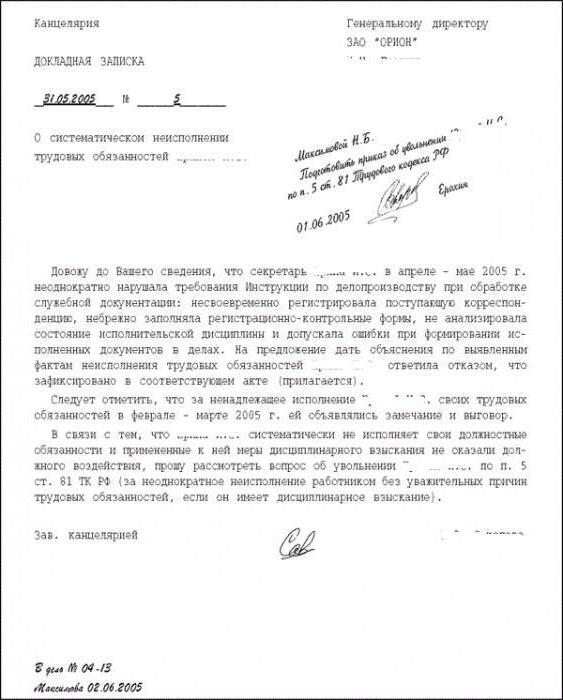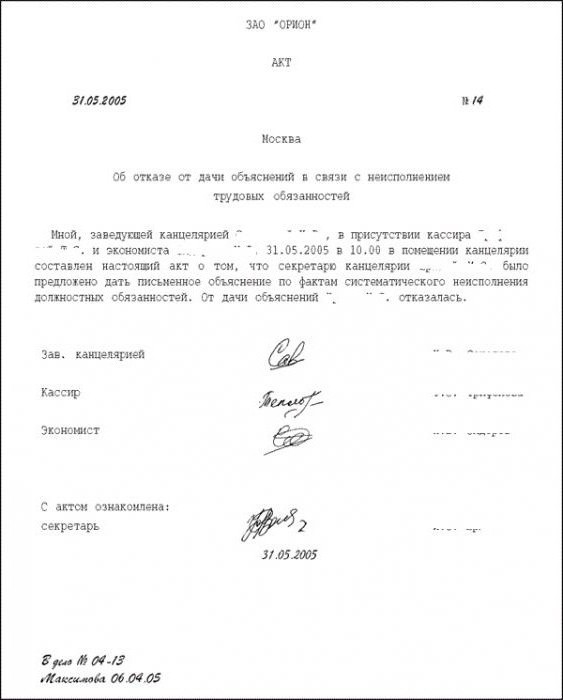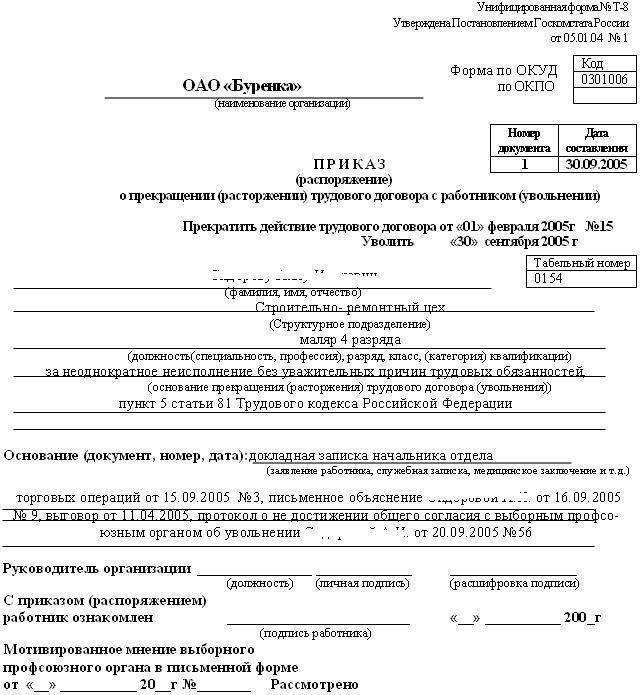Improper performance of official duties: responsibility. Grounds for termination of the employment contract at the initiative of the employer
All employees, when they get a job, sign an employment contract, which contains a list of their job duties. Also, employees are required to obey the internal regulations of the organization, observe the working hours and follow the job description. Improper performance of official duties leads to dismissal, and in some cases, employers dismiss negligent employees precisely under the article.
What the law says
Let us consider in more detail those violations for which dismissal may follow:
- The absence of an employee at his workplace, which is not supported by any valid reasons. Repeated delays are also taken into account.
- The unwillingness of the employee to fulfill his labor obligations when changing labor standards or internal regulations.
- Periodically repeating violations in labor activity or work regime. If the violation was detected once, then a disciplinary sanction is imposed on the employee.
Who determines that an employee is not coping
Failure to perform or improper performance of duties is when an employee has certain labor obligations, and he is quite able to cope with them on his own, but does not do this for unknown reasons.
Anyone can reveal this fact: from a manager to an ordinary client who was not served by an employee. If the non-fulfillment was revealed by the head of the department, then he must record this event in a memorandum to the higher management. If it was a client, then he can make a complaint and also transfer it to management. Such a document is the basis for checking an employee for improper performance of official duties.
The complaint itself is not a reason to bring a person to disciplinary responsibility, but if during the audit the facts set out in it are confirmed, then this may serve as a start to the process of dismissal.
There are cases when the duties of an employee include the execution of various assignments. To protect themselves from possible misunderstandings, management should set out such tasks in writing and let them get acquainted with them under the signature. In the case when the task is ignored, this must also be fixed.
The legislation does not establish a list of persons who can identify improper performance of work. As mentioned earlier, it can be anyone. It is important that all information contained in the note be true.
An example for an employee is shown below:

And before punishing an employee, you should find out the reason for such behavior. It may turn out that he simply does not know how to do what is required of him. But he does not know how and does not want to know how - these are two different concepts. And this must also be taken into account.
It is better to say that the employee does not cope with the specified duties if he really does not have the necessary skills or abilities that are needed for the successful outcome of the case.
By law, an employer is not required to train its employees, but practice shows that many job seekers need it. Therefore, before demanding something from a new employee, it is better to provide him with an unpaid internship with a more experienced employee.
Registration procedure
If the improper performance of official duties (Article 192 of the Labor Code of the Russian Federation) has been proven, then the management can proceed to the process of dismissal. This procedure takes place in several stages:
1. Recognition of the facts. Any task that an employee must perform must be reflected in writing and given to him against signature. If this instruction is not fulfilled, this event is recorded in a special act or in a report (an example of a report is presented below).

2. Carrying out a check on the fact of non-fulfillment. At this stage, all information that proves improper fulfillment of obligations should be collected.
3. Obtaining explanations from the employee. This step is considered mandatory. If the employee did not complete the assigned task and did not begin to write an explanatory note on this matter, this does not mean that the process leading to punishment should be stopped. An explanatory note can both serve as a basis for bringing a person to responsibility, and prove his innocence, in other words, confirm that the failure did not happen on purpose. It is important to know that if the manager assigned a task that is not part of the employee's duties, and he did not complete it, this is not a basis for disciplinary punishment.
If an explanation is provided, then:
- the stated facts must be studied and verified, and a conclusion must be made about the validity of the information provided;
- the presence and degree of guilt of the employee are revealed;
- find out why the failure occurred;
- the attitude of the employee to work before the incident is revealed.
When the violation does not entail serious consequences for the company, the employer may limit himself to a remark or reprimand. More serious misconduct should result in the termination of the working relationship with the employee.
4. Issuing an order. The order is issued in the case when a disciplinary sanction is imposed in the form of dismissal. It should reflect the facts about the presence of previous comments or reprimands, acts that reflect unfulfilled obligations, as well as a description of violations (place, time period, circumstances and documents confirming this).
The submitted documents are the grounds for termination of the employment contract at the initiative of the employer.

Timing
In order to submit an explanatory note to the management, the employee is given two days from the moment he read the request for this document. If the punishment is unavoidable, then the employer must enforce it within a month from the moment when the improper performance of official duties is discovered. This period may be extended if the employee was on sick leave.
Disciplinary sanctions are not applied if more than six months have passed since the violation.
In case of violations that are identified by audits or audits, the employee should be punished within 2 years from the moment they were discovered.
According to legislative norms, there are categories of employees who cannot be subject to disciplinary action in any case. These include:
- women in position;
- an employee on sick leave or vacation.
Dismissal. Payouts
If the employer has not violated paragraphs of Art. 5.27 of the Code of Administrative Offenses of the Russian Federation, as well as the failure of the employee to fulfill labor obligations, it is possible to issue an order for dismissal. This document must contain all the necessary information proving the fact of guilt.
The employee himself must be familiar with this order. If he did not want to do this, it is necessary to draw up an act fixing this circumstance. And already in the dismissal order, indicate all the grounds for terminating the employment contract at the initiative of the employer and the relevant documents confirming the guilt of the employee.

With regard to compensation payments, dismissal under the circumstances described above does not provide for the payment of any special allowance. The employee is only entitled to wages and vacation pay (if the vacation is deserved and not taken off).
Enrollment in labor
Entries in the work book and in the personal file must be made on the basis of an order. Personnel workers are referred to when recording at Art. 81 of the Labor Code of the Russian Federation.

Employer's responsibility
If the employer applies such a type of punishment as a penalty for failure to perform official duties, then this must be approached with all seriousness. At the slightest shortcomings and the opportunity to challenge the decision of the employer in court, penalties may be imposed on the latter.
When leaving, check:
- whether the employee has outstanding disciplinary sanctions;
- correct execution of all penalties (it is imperative to attach a sample memorandum to the employee);
- the presence of the employee's signature on familiarization with official duties and other documents that are directly related to his work activity;
- the correctness of the entire process of bringing the employee to disciplinary responsibility.
If the employer made mistakes and the result of the dismissal was challenged in court, then he will be held administratively liable. In addition, he will be obliged to reinstate the employee and pay him a compensation.
By the way, for leaders, the responsibility prescribed in Art. 5.27 of the Code of Administrative Offenses of the Russian Federation. In this case, any administrative punishment is applied only by state bodies.
Consequences for the employee
As such, the legal consequences of dismissal under Art. 81 the citizen does not have. But the record corresponding to this article will not have a very good effect on the status of a person when he wants to triple in another job.
Dismissal for improper performance of official duties is not a reason to end your working career, but you still don’t need to allow such entries in the labor form.

Arbitrage practice
Judicial practice shows that the fact of dismissal can be challenged:
- If the order was issued incorrectly. The specific action that led to the violation was not indicated (an example of a memorandum was given earlier).
- If the offense does not correspond to the severity of the punishment.
- When the violation first occurred.
- In the process of identifying the violation, no explanation was requested from the employee.
- The deadlines have been exceeded in relation to those established by law.





